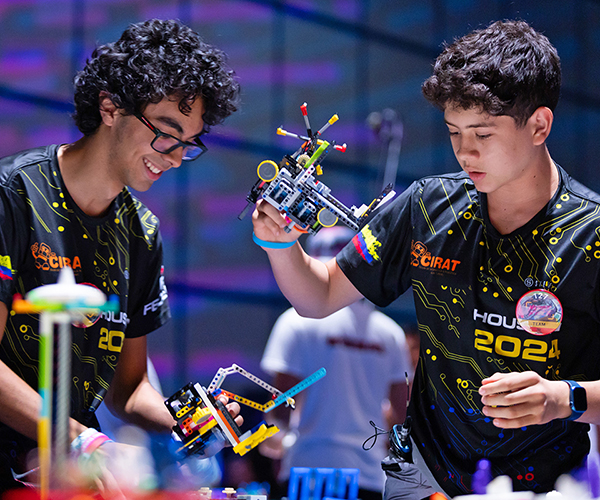To help maintain or encourage a healthy child, parents must live a healthy lifestyle, says Dr. Robert Needlman, primary care pediatrics specialist at MetroHealth Medical Center. Here are three tips for preventing and treating obesity.
1. Don't go it alone. Obesity is a complicated medical condition, says Needlman. "Parents should be working with well-trained doctors and nutritionists."
2. Take care of the obvious. Cut the high-fat, high-sugar diet and excessive TV, computer or video game use. "You have to have changes in lifestyle."
3. Refuse to quit. Committing to make changes means rearranging schedules, changing household rules and even altering your family time. "What you may find fun may actually be unhealthy — like going out for a big, cheesy pizza."
// Tara Golenberke
There are ways your child can learn in the home, says Paula Leigh-Doyle, head of school at Hershey Montessori School. She recommends activities that help development and build independence.
1. Help wanted. "Always show your child how to clean up when they are done with their task," Leigh-Doyle says. For example, sorting silverware from the dishwasher is a good cognitive matching task but also lets your child feel like a contributor.
2. Make clean-up easy. Install a low shelf-unit in the family room for a child's toys. With everything having a place on the shelf instead of piled up in a toy box, cleaning up after play is much easier for the child.
3. Recycle items into toys. Keep some old cushions and sheets for kids to use in open-ended play like building forts. This will keep them from ruining good furniture.
// Meghan Bogardus
Understanding your emotions and those of others is important for social development, says Sheila Santoro, director of counseling at Hathaway Brown's Upper School. Follow these tips for developing your child's emotional intelligence.
1. Recognize and label emotions. When a child has a meltdown, begin by recognizing that he or she is upset, Santoro suggests. This doesn't mean giving in; it is just acknowledging feelings.
2. Help deal with bad feelings. "It's not about judging," Santoro says. For example, if your child is having a conflict with another student in school, you should recognize why he or she is upset, and if it's severe enough, provide coaching on how to deal with it.
3. Be a role model. It helps children understand how to manage their emotions by watching their parents, Santoro says. By telling your child you value his or her emotions, you are modeling how to do that as well.
// MB
Reading skills are crucial for academic development. But what if your child struggles with reading? Vanessa Diffenbacher, head of Lawrence School's Lower School, shares some tips for reading development and how parents can figure out if a child needs additional assistance.
1. Provide a reading corner. "Sometimes if you just make a nice, welcoming place for the children, they're more willing to go and do their reading because they want to be in that place."
2. Practice vocabulary. If your child is struggling to read, continue to build age-appropriate vocabulary. "Even though they can't read a second-grade book, it's important that they listen to them being read for language development."
3. Recognize if there is a problem. Consider having a reading assessment done to find the root of the issue. An assessment, which Lawrence provides for free, will help determine whether the components are intact for reading properly.
// Lauren McGrath
A child with ADHD or another attention disorder can sometimes add family stress. Dr. Jane Hellwig, a clinical psychologist at The Attention Center, suggests these strategies for a happy household.
1. Focus on your relationship. "These children really need a very secure base with parents and family," says Hellwig. Difficulties in school or with friends should never come between the family bond. The home should be a place where difficulties don't exist.
2. Play to the strengths. "People with ADHD are delightful," Hellwig says. "They think outside the box." Parents should celebrate and encourage their children's energy and creativity. Find things they do well and enjoy them.
3. Catch them doing what's right. Good behavior should be affirmed and celebrated. "It's so easy for us to get stressed about stuff that doesn't matter," says Hellwig.
// MB
Raising independent children begins with giving them a chance to do things on their own. Here are three building blocks to greater independence and self-esteem, according to three Gilmour Academy teachers.
1. Give them a simple task. Let them pick out their clothes, for example. "It is the greatest compliment you can give your child, because if you ask them to do something themselves, that means you feel that they can," says Randi Russell.
2. Pair praise with actions. Show they're doing well through increased responsibility, says Mary Beth Hayes-Zatko.
3. Let kids solve their own problems. "Parents shouldn't rush into answering all questions or solving all problems," says Desia Joseph. Act as a consultant, but let the kids figure it out.
// MB
Having a rambunctious toddler can be exciting and nerve-racking. Dr. Anthony DeRoss, medical director for the Level 1 Pediatric Trauma Center at Rainbow Babies & Children's Hospital, provides toy safety advice that could prevent a trip to the ER.
1. Find age-appropriate toys. Many of the injuries De-Ross observes are related to cuts, bruises and scrapes from toys. Following age designations on toy labels can prevent this.
2. Think about it. "Make sure that it looks safe from a common sense standpoint. Make sure it doesn't have any sharp edges or long, thin pieces that could poke into an eye or pieces that might easily break off and be swallowed or lodged in the airway."
3. Supervision is key. "Close parental supervision will help to minimize the incidence of injuries and also prevent them from becoming more serious when they do occur because they are identified quickly."
// LM
Cherish the time you have with your little one before it is gone, says Mary Beth Hilborn, early childhood director for Hawken Schools. She provides some tips on child rearing.
1. Discover who they are. "So many times with parents, we have an idea of where we might want our children to be or who we might want our children to be, and sometimes, we miss who they really are."
2. Establish a consistent routine. Having a habitual family activity will help create a healthy family bond. "The important part is that you find them and that you keep them regular ... for children to look forward to."
3. Find someone who is kid-friendly. Being an expert in a specific field doesn't always translate into working with children. "If you're taking an art class, you'd rather someone know something about children than to be a great artist."
// LM
Learning music can aid in the development of several life skills, says Eric Gould, director of the department of music at The Music Settlement. Here are ideas for encouraging music appreciation.
1. Play music at home. Turn off the TV and put on some music. Sample different styles from classical to jazz to something you can dance to. "Playing music in the home is how a child learns to value music in the first place."
2. Make music fun. Take them to concerts or where other kids are enjoying and playing music. Let them experiment and encourage them to practice. It's critical to provide "the opportunity to spend time with other kids who believe music is cool."
3. Praise the effort. Praise your child when she does something successfully, but "it is especially imperative to praise the child after a time of difficulty."
// TG
Social learning can be as important as academic curriculum during early child education, says Katherine Hatcher, director of the Lower School at Lake Ridge Academy. Here are tips for developing a socially strong child:
1. Give independence a chance. A child who can effectively socialize, understand what's right and gain self-discipline must try out those skills, says Hatcher. "Offer opportunities that allow children to view themselves as problem-solvers."
2. Let them play. "Play is organized too quickly, and it's usually run and ruled by adults, which could cause them to become dependent and learn skills much slower."
3. Worried? Get another perspective. "Seek out the advice of the child's pediatrician, any of the teachers the child has and listening to their own intuition."
// TG
Many things go into having a healthy, active child. Tina Schneider, executive director of the Montessori School at Holy Rosary, suggests a few basic (and fun) things you can do in your home.
1. Do purposeful work. Have your child participate in household work with you. "It's a fun way to have them be involved while mom and dad are doing chores," says Schneider. For example, pack a lunch together that gives the child choices between healthy items.
2. Make chores into a game. Tasks such as cleaning a room can be turned into a timed game. Rewards for completing activities can be things like walks, bike rides and playing outside.
3. Don't over-schedule. Don't sign up a child for too many activities. Instead, rotate between them, doing one for six months or a year and then trying out another. "It's a lot less stressful on parent too," Schneider says.
// MB



